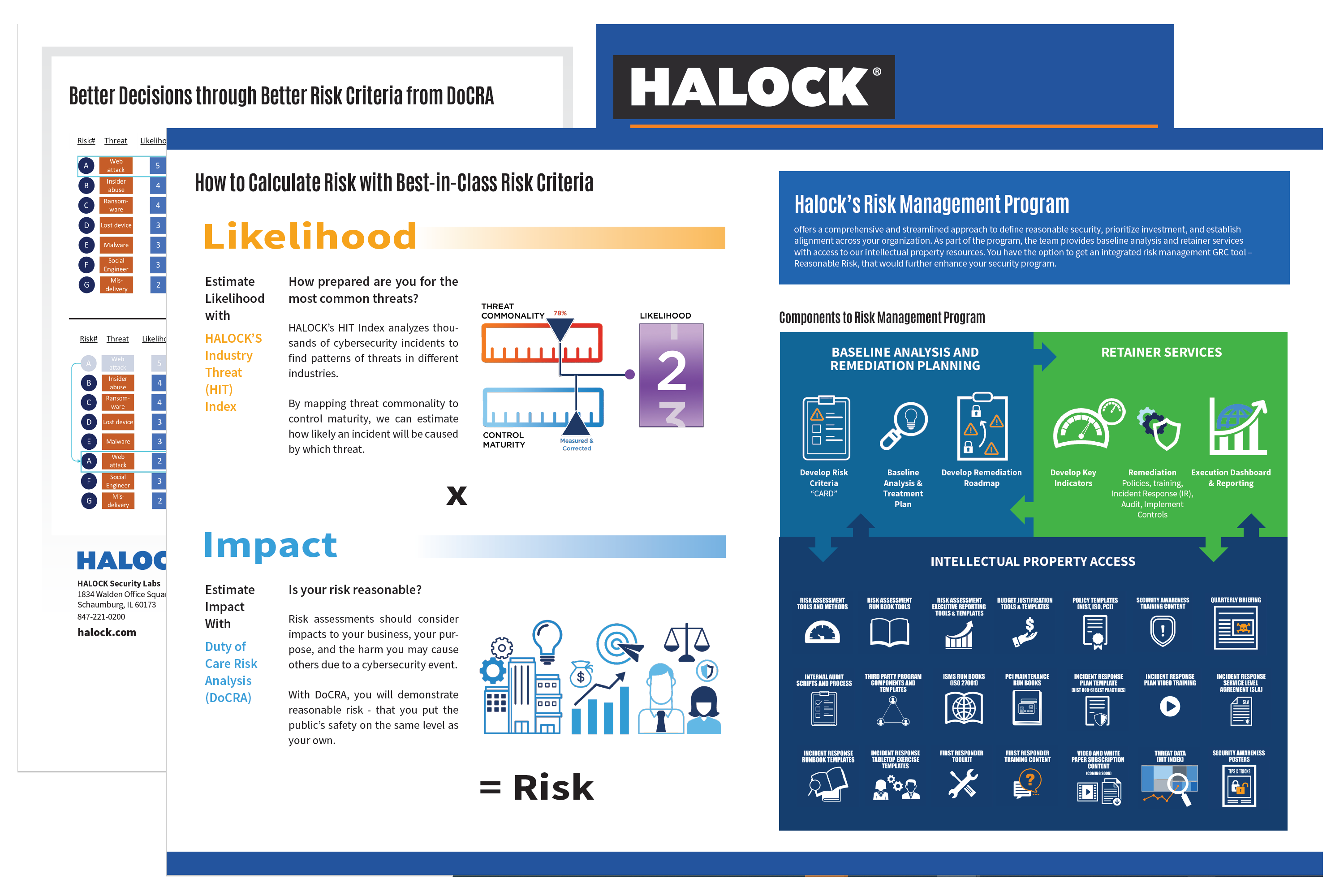Compliance
PCI, HIPAA, GDPR, CCPA, CMMC Readiness and Other Compliance Services
How HALOCK Can Help with Compliance
HALOCK assists organizations in navigating the complexities of compliance with information security laws. We guide clients through risk assessments and the risk management process, helping them implement the necessary security controls for their unique environment.
Our Compliance Services Include:
- PCI DSS Compliance
- HIPAA Security Rule & Meaningful Use
- Massachusetts 201 CMR 17.00 & State Breach Laws
- Gramm-Leach-Bliley Act (GLBA)
- ISO 27001 Implementation
- FISMA Compliance
- DoCRA (Duty of Care Risk Analysis)
- GDPR Compliance
- California Consumer Privacy Act (CCPA)
Additionally, we support organizations in managing cyber security risks after data breaches, ensuring that they adhere to regulatory requirements and industry best practices.
SEC Cybersecurity Risk Management Rules
The U.S. Securities and Exchange Commission (SEC) has introduced new rules on Cybersecurity Risk Management, Strategy, Governance, and Incident Disclosure. Public companies are now required to disclose details about their cybersecurity programs in periodic reporting, including how they manage and mitigate risk.
HALOCK helps clients prepare for these updates by developing tailored criteria for assessing and accepting cybersecurity risks.
Why Choose HALOCK?
We have extensive experience helping clients evaluate and mitigate risks associated with sensitive information. Our team works with you to:
- Develop risk management strategies that align with your unique security, compliance, and business needs.
- Assess the impact and likelihood of potential threats.
- Implement “reasonable” safeguards based on your environment.
Our goal is to ensure that your organization is compliant, secure, and prepared to manage any future cybersecurity threats effectively.
Get Compliant with Information Security Laws and Regulations
Organizations that handle sensitive information, such as personal data, financial information, intellectual property, or critical infrastructure systems, are subject to various laws and regulations aimed at protecting that information. Compliance with these regulations is critical to avoid legal penalties, security breaches, and reputational damage.
Why Risk Assessment and Risk Management Are Crucial
Risk management is at the core of compliance with information security regulations. Organizations must assess the risks they face, evaluate the effectiveness of their controls, and implement measures that reduce these risks to acceptable levels.
Key Elements of a Strong Risk Management Strategy:
- Risk Identification: Recognize potential security threats and vulnerabilities.
- Risk Evaluation: Assess the likelihood and potential impact of these threats on your organization.
- Safeguard Recommendations: Implement safeguards that are “reasonable” based on your organization’s objectives, mission, and obligations.
Upcoming Event: PCI DSS v4.0 Webinar Series
Preparing for Your Transition to PCI DSS v4.0
As PCI DSS v3.2.1 expires on March 31, 2024, organizations must prepare for the changes in PCI DSS v4.0, which includes 64 new requirements. These changes focus on enhancing risk evaluations and improving overall security compliance.
Join Viviana Wesley, CISM, PCI QSA, ISO 27001 Auditor, and Principal Consultant at HALOCK, for our 5-part PCI Webinar Series. Learn about the updates, new requirements, and best practices for transitioning to PCI DSS v4.0.
Learn More About Our Risk Management Services
At HALOCK, we offer a comprehensive Risk Management Program that helps organizations prioritize investments while balancing security, compliance, and business goals.
- Learn How to Establish Reasonable Security: Understand how to implement security controls that are both effective and feasible for your organization.
- Assess and Manage Risk: We provide tools and expertise to help you identify and manage risks, ensuring compliance and safeguarding your critical assets.
Contact HALOCK to Get Started with Your Compliance Journey
Ready to ensure your organization meets all applicable information security regulations? Contact HALOCK today for a consultation on risk assessments, compliance, and risk management solutions.






